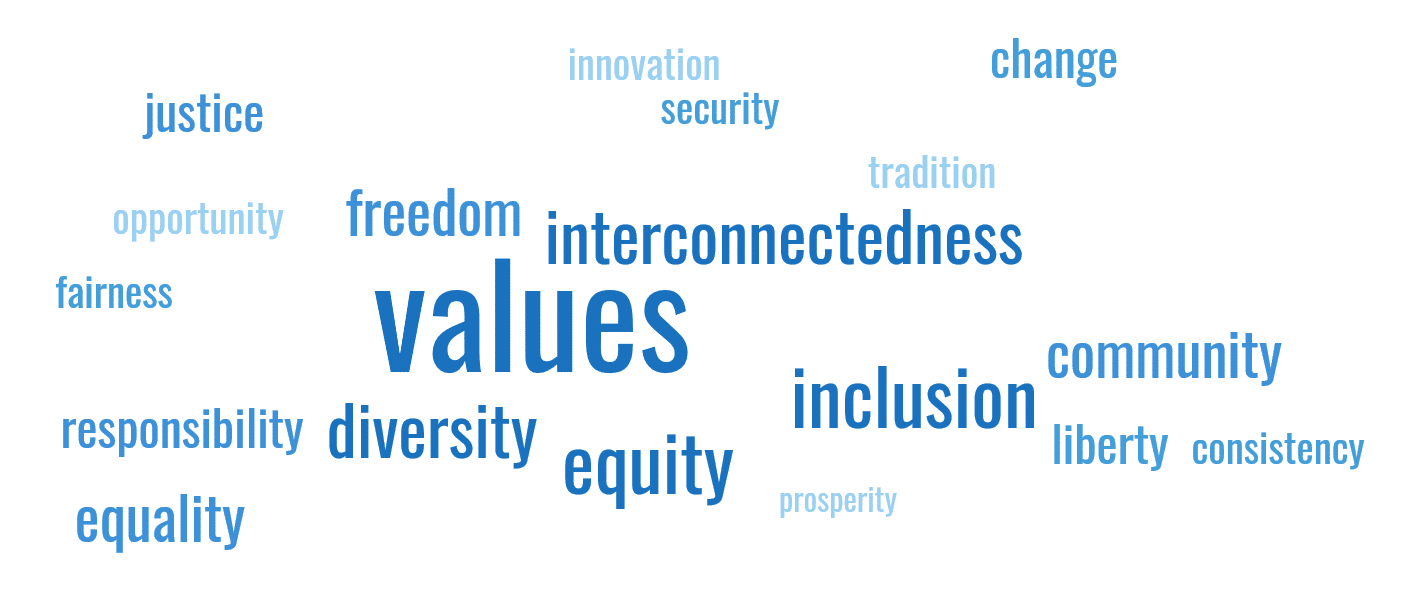Understanding ourselves and others
Dear collaborative discussion friends,
This time we are highlighting two activities that help to identify personal and shared values. The activities examine how values show up in discussions and how they are prioritized differently in different contexts. By focusing on values, we can develop a deeper understanding of what is behind the discussion. This helps to humanize and appreciate the complexity of our fellow discussants and their ideas.
Both activities can be found in the Introduction to Collaborative Discussion Module, contributed, respectively, by Jack Byrd Jr., Professor of Industrial Engineering at West Virginia University and Martin Carcasson, Professor of Communication Studies at Colorado State University.
If you missed the previous newsletter about Expanding Thinking with Metaphors, you can access it and our other weekly newsletters by subscribing below.
This week’s activities:
Activity 1.5 – The Role of Values in Collaborative Discussion
Activity 1.6 – Understanding Values in Context
Focusing on values to facilitate difficult discussions
We have all participated in difficult conversations. These seem more common than ever. There is a tendency for these discussions to get heated, derailed, or just stuck. By introducing skills that empower discussants to identify and explore the ways that values play out in a discussion, we create opportunities to instill curiosity, engagement, and deeper understanding.
How do you introduce the importance of understanding values in a discussion?
Begin by asking participants to reflect on their own values. Ask: what drives your actions? What do you ask yourself when you are making a decision? For example, maybe you are motivated by figuring out what is fair, just, responsible, sustainable, harmonious, traditional, equitable, etc.
Offer 2-3 minutes for quiet reflection and writing. Encourage participants not to self-censor. Ask them to write down words that they consider to be a personal value. Remind them not to worry if their values seem contradictory. We all contain multitudes.
Next, invite participants to craft a few value statements that capture them as a person. You may need to provide a few examples, like:
- I value personal responsibility and self-sufficiency. I believe that I alone am responsible for my actions.
- I value tradition. I think we should make decisions based on what has been tried and developed through years of experience and cultural context.
- I value common good. I believe we are interconnected and interdependent. We must take care of one another even when it is not in our own immediate interests as individuals.
Ask participants to share their value statements in pairs or small groups. Invite them to explore these values from a place of curiosity. No judgment or critical feedback. Some curiosity questions might include: Where does this value come from? What experiences helped to shape this belief or value? Can you tell me more?
At this point, you have a choice:
- Option One – Dive Deeper. The groups can then go on to create group values that they think are important for collaborative discussion. Guide the group through discussion of an issue but with the goal of identifying the values that inform individual comments or points of view. Detailed instructions, debriefing questions, and journal prompts are included in the full activity description.
- Option Two – Complexify Values. Introduce the expedited version of the activity below to explore how values are not static, but relational and responsive to specific topics. By building on the previous activity, participants will be encouraged to think about how values can change or be prioritized differently in different contexts.
Begin this activity by listing the most common values generated from the activity above. Or, provide a list of common values. Each value should be written on a small slip of paper.
Ask participants to individually rank the top 5 values by placing the most important slip on the top and the least important on the bottom, ordering them according to their own beliefs. You can pause to discuss the top few values and what they mean to participants. Values will be interpreted differently. Explore this.
Next, introduce a topic or statement, like “The federal government should pass strong gun regulation.” Ask participants to think about their answer and then sort the values (slips of paper) to support their answer. For example, if they disagree with this statement, they might move the “individual freedom” slip of paper to the top of the list.
Do this a few more times. Introduce a new topic or statement. Ask them to rearrange their top values according to their responses. Discuss how the rankings shifted according to the topic. Discuss how this complicates how we understand values and how they show up in discussions. Detailed instructions, debriefing and reflection questions, as well as additional resources can be found in the full description of this activity.
These activities can be modified and used together or offered as stand alone activities to improve understanding of values in discussion. Both activities encourage participants to reflect on their own values and seek out the values of others.
If you try out these activities, please share with us what you think:
We hope these toolkit activities help you facilitate discussions, especially on difficult topics in your classrooms, workplaces, or communities. In our next newsletter, we will demonstrate how to pair activities focused on critical thinking and critical feeling to help groups better understand how they react in discussion.
Upcoming Events
- We are accepting applications for our next Collaborative Discussion Coach Training (May 31 – June 6). This training is open to anyone interested in offering certificate programs in the future. You can apply here or share this newsletter with people you think might be interested.
- We are also accepting nominations for our Pilot Coach Training for Undergraduate Students. Space will be limited. You can learn more or nominate a student by emailing me at [email protected]
Looking forward to collaborating with you this year,
Shannon Wheatley Hartman & the Collaborative Discussion Team






